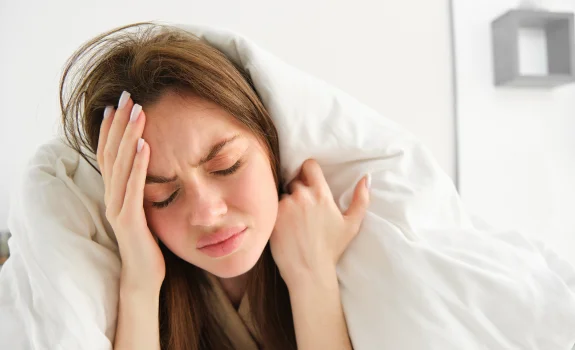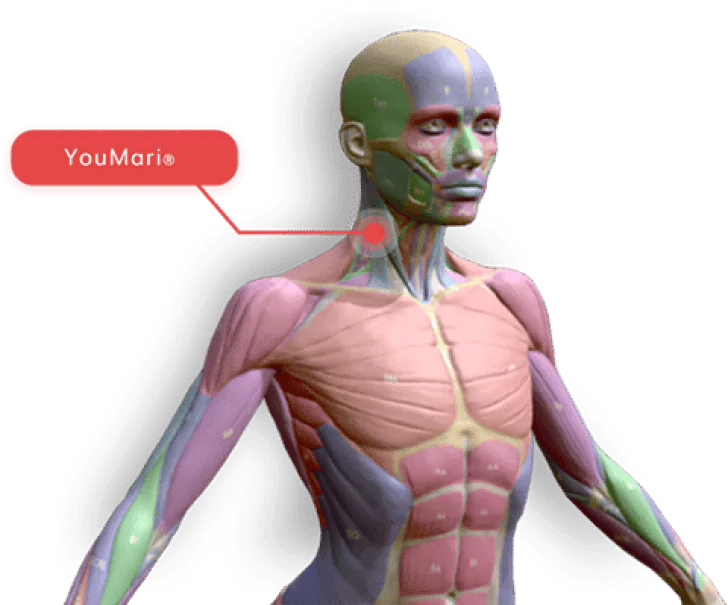Discover advanced, personalized solutions for sleep disorders through cutting-edge diagnostics, non-invasive therapies, and real-time monitoring—delivered in our clinics, at home, or onsite at your workplace.
Sleep disorders encompass a wide range of conditions that disrupt normal sleep patterns, affecting physical, mental, and emotional well-being. Common sleep disorders include insomnia, sleep apnea, restless leg syndrome, and circadian rhythm disorders.Poor sleep can lead to fatigue, cognitive impairment, weakened immune function, and an increased risk of chronic conditions like diabetes, heart disease, and depression. Identifying and addressing the underlying causes is essential to restoring restful sleep and improving overall health.


We take a comprehensive approach to treating sleep disorders, starting with at-home sleep studies and a detailed environmental and stress profile to uncover the root causes of poor sleep. Using clinically validated biometric wearable devices, we monitor progress in real time, ensuring improvements are measurable, permanent, and serve as an early warning system for potential relapses.
Our therapies focus on addressing inflammation, hormonal imbalances, and lifestyle factors that disrupt sleep. By combining advanced diagnostics with personalized treatments, we empower you to achieve restorative, high-quality sleep.

Experience hands-on care and advanced regenerative therapies in a relaxing, state-of-the-art environment.
Continue your healing journey with easy-to-use devices designed for at-home therapy.
Bring regenerative medicine to your workplace, improving employee health and productivity.
Our Regenerative Therapies our Not the Alternative, they are the
BEST CHOICE
We are committed to personalizing treatment plans based on what is best for every individual’s UNIQUE circumstances to include symptoms, budget, lifestyle, and goals. Conservative (non-pharmaceutical) care is often effective in resolving issues impacting sleep. This can be as simple as coaching you on when and how much you eat and hydration, or might be a noninvasive at-home sleep study with our state of the art wearable biometric devices.

We will review your health history, symptoms, and current treatments to help determine the severity of your condition. We may recommend additional testing and analysis to get a full picture of potential therapies personalized to you.
If your condition qualifies for conservative care options, we will present a treatment plan that includes only those therapies proven to be effective in treating your condition. This may include comprehensive lab testing and AI analysis if the potential cause is a suspected hormone imbalance. Additional options include sleep studies, DNA nutrigenomics analysis for lifestyle design, food sensitivities, and other therapies to resolve issues that are preventing healthy sleep. You will be provided with treatment plan options and timelines with transparent out-of-pocket costs to you.

Sleep disorders, such as insomnia and sleep apnea, can significantly impact overall health and quality of life. Integrative and regenerative medicine therapies offer various approaches to improve sleep quality and address underlying issues. Here’s a summary of effective therapies and related studies:
Shockwave Therapy (Extracorporeal Shock Wave Therapy) primarily targets musculoskeletal issues, but emerging research suggests it might have applications for sleep disturbances, particularly those related to pain.
Red Light Therapy (Low-Level Laser Therapy) uses specific wavelengths of light to promote cellular healing and reduce inflammation, which can affect sleep quality.
Inflammation Programs focus on dietary changes, supplements, and lifestyle adjustments aimed at reducing chronic inflammation, which can negatively impact sleep.
Bioidentical Hormone Replacement Therapy involves using hormones that are identical to those the body naturally produces to address hormonal imbalances affecting sleep.
Neuro Inflammation Programs focus on reducing inflammation in the brain, which can affect sleep and mood.
Hands-On Medical Massage involves therapeutic techniques to relieve muscle tension and stress, promoting relaxation and better sleep.
Sleep Programs focus on improving sleep hygiene, addressing sleep disorders, and promoting better sleep quality through various interventions.
For effective management of sleep disorders, the following integrative and regenerative therapies have shown promise:
Integrating these therapies into a comprehensive approach can help address sleep disorders effectively and improve overall well-being.
Shockwave Therapy (Extracorporeal Shock Wave Therapy) is generally used for musculoskeletal conditions, but there’s interest in its effects on sleep.
While ESWT is primarily used for pain management, its ability to reduce chronic pain might indirectly improve sleep by alleviating discomfort that disrupts sleep.
Red Light Therapy (Low-Level Laser Therapy) uses specific wavelengths of light to promote cellular repair and reduce inflammation, which can affect sleep.
Red light therapy can help regulate circadian rhythms, reduce inflammation, and improve sleep quality by promoting relaxation and reducing insomnia symptoms.
Inflammation Programs focus on dietary changes, supplements, and lifestyle modifications to reduce chronic inflammation, which can affect sleep.
By reducing systemic inflammation through diet and supplements, inflammation programs can alleviate sleep disturbances and support better sleep.
Bioidentical Hormone Replacement Therapy involves using hormones identical to those naturally produced by the body to correct hormonal imbalances affecting sleep.
BHRT can help balance hormones that regulate sleep, such as estrogen and progesterone, improving sleep quality and reducing insomnia symptoms.
Neuro Inflammation Programs address inflammation in the brain, which can affect sleep and cognitive function.
Reducing neuroinflammation can improve sleep quality and reduce disturbances by addressing inflammation that impacts brain function and sleep regulation.
Hands-On Medical Massage involves therapeutic techniques to relieve muscle tension, stress, and pain, which can affect sleep quality.
Medical massage can reduce muscle tension and stress, promote relaxation, and improve sleep quality by alleviating discomfort and promoting overall well-being.
Sleep Programs focus on improving sleep hygiene, addressing sleep disorders, and promoting better sleep through behavioral and lifestyle interventions.
Comprehensive sleep programs address factors like sleep environment, routines, and behavioral strategies to improve overall sleep quality and manage sleep disorders effectively.
These therapies can be integrated into a personalized treatment plan to effectively manage sleep disorders and enhance overall well-being.
Common types include insomnia (difficulty falling or staying asleep), sleep apnea (breathing interruptions during sleep), restless legs syndrome (uncomfortable leg sensations), narcolepsy (excessive daytime sleepiness), and parasomnias (abnormal behaviors during sleep, like sleepwalking).
Causes can include stress, anxiety, depression, poor sleep hygiene, medical conditions (e.g., diabetes, asthma), lifestyle factors (e.g., excessive caffeine), and certain medications.
Maintain a regular sleep schedule, create a comfortable sleep environment, avoid caffeine and heavy meals before bed, engage in relaxing activities, and limit screen time before sleep.
Seek medical advice if you have persistent trouble sleeping, excessive daytime sleepiness, or symptoms of a sleep disorder that disrupt your daily life.
Symptoms include loud snoring, choking or gasping during sleep, excessive daytime sleepiness, difficulty concentrating, and irritability.
Sleep apnea is typically diagnosed through a sleep study, known as polysomnography, which monitors various physiological parameters during sleep.
Yes, treatment options include cognitive-behavioral therapy for insomnia (CBT-I), lifestyle changes, sleep hygiene improvements, and managing underlying medical conditions.
Diet can impact sleep quality. Avoiding caffeine, heavy meals, and alcohol close to bedtime can improve sleep.
Natural remedies include herbal supplements (like melatonin or valerian root), relaxation techniques, and creating a calming bedtime routine.
Stress management techniques such as mindfulness, meditation, deep breathing exercises, and regular physical activity can help reduce stress and improve sleep quality.
For persistent or severe sleep issues, consulting a healthcare provider or sleep specialist is essential for a proper diagnosis and treatment plan.
We treat a wide range of sleep disorders, including insomnia, sleep apnea, restless leg syndrome, and circadian rhythm disruptions.
Our at-home sleep studies use advanced diagnostic tools to monitor your sleep patterns, identify disruptions, and determine the root causes of your sleep issues.
PBM reduces inflammation, supports hormone regulation, and enhances cellular energy production, promoting relaxation and improved sleep cycles.
Hydrogen inhalation therapy combats oxidative stress and systemic inflammation, which can disrupt sleep. It helps calm the nervous system, promoting restorative sleep.
These devices track sleep quality, stress levels, and other metrics in real time, allowing us to monitor progress, ensure long-term improvements, and identify potential problems early.
Stress profiling helps identify lifestyle or environmental factors—such as elevated cortisol or a disruptive sleep environment—that may interfere with sleep. Addressing these factors improves outcomes.
Genetic testing identifies predispositions affecting sleep cycles, hormone production, and neurotransmitter balance, enabling us to create highly personalized treatment plans.
In many cases, our therapies reduce or eliminate the need for medications by addressing the root causes of sleep issues. Consult with our team to determine the best approach for your needs.
Yes, all our therapies are non-invasive, safe, and designed for long-term use without harmful side effects.
Many patients experience improvements in sleep quality within a few weeks. However, lasting results depend on addressing the root causes through a personalized treatment plan.
Book a consultation with our team to discuss your symptoms, undergo an at-home sleep study, and create a personalized plan to achieve restful sleep.
See Plans & Pricing

Connect with us over our social platforms & find special deals for you!
© Copyright 2025. All rights reserved.